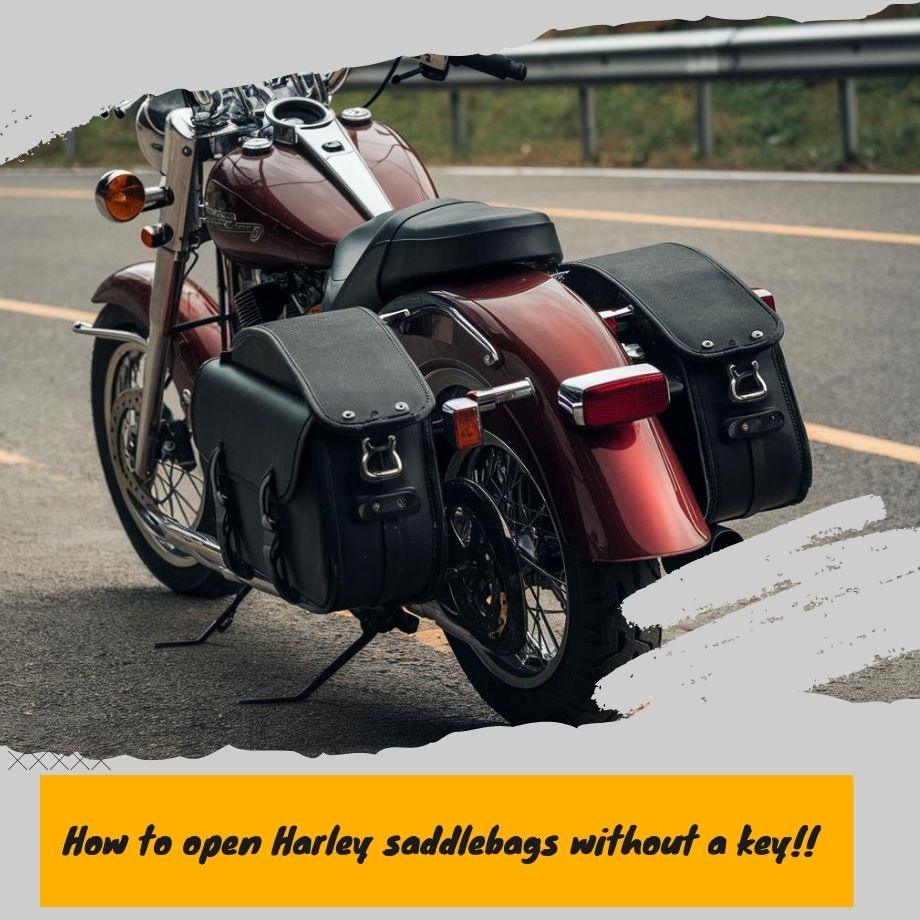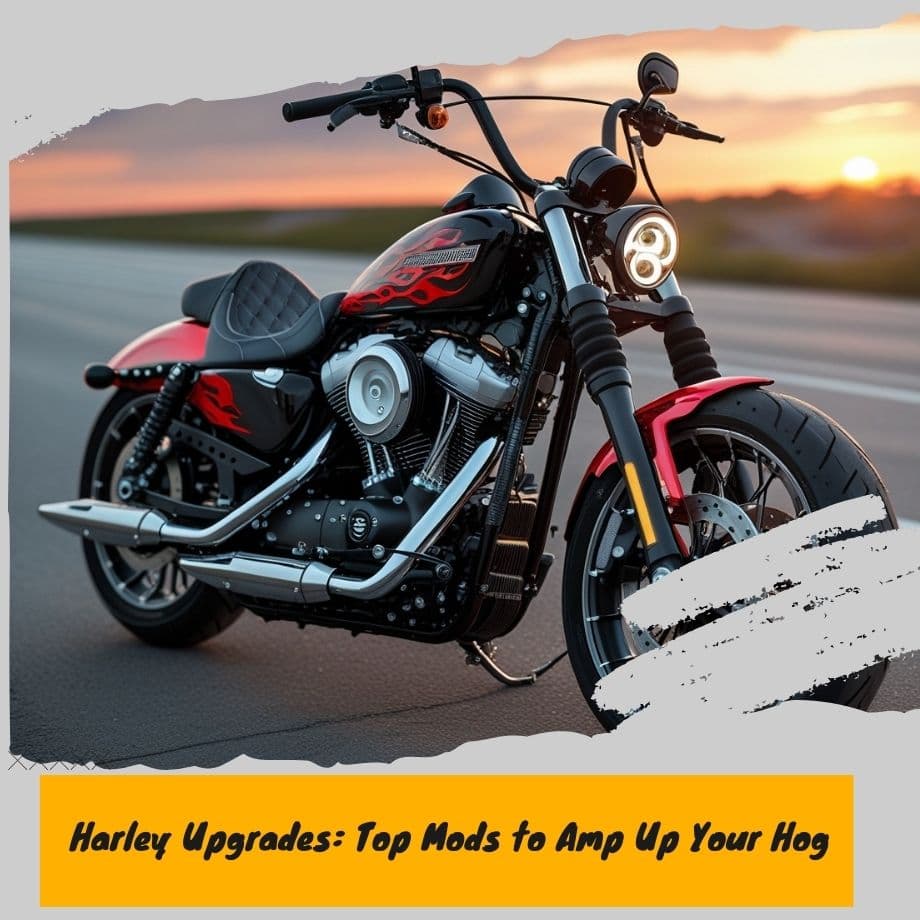Lost Your Keys? 3 Ways to Get Into Your Harley Saddlebag in a Pinch

Harley-Davidson saddlebags are sturdy luggage compartments mounted on either side of the motorcycle's rear fender.
They provide essential storage space for riders to carry personal belongings, tools, and other essentials while on the road. Saddlebags are a quintessential feature of Harley motorcycles, contributing to their iconic styling and practicality.
There are various situations where a rider may need to access their saddlebags without a key. Keys can be misplaced, lost, or damaged, leaving the saddlebags locked and inaccessible.
Additionally, in emergency situations or roadside breakdowns, gaining access to tools or essentials stored in the saddlebags can be crucial. While it's always advisable to have a spare key on hand, there are methods to open Harley saddlebags without a key when faced with such circumstances.
Safety Precautions
Before attempting to open your Harley-Davidson saddlebags without a key, it's crucial to take proper safety measures to avoid damaging your bike or injuring yourself.
Saddlebags are an integral part of your motorcycle, and improper handling can lead to costly repairs or even render them unusable. Always exercise caution and patience when attempting any non-destructive or destructive methods.
You May Also Like: EXPERT TIPS FOR ROCKING ROAD KING SADDLEBAGS
It's recommended to work in a well-lit area, preferably on a level surface, and secure your motorcycle to prevent it from tipping over during the process. Wear appropriate protective gear, such as gloves and safety glasses, to protect your hands and eyes from potential injuries.
Additionally, ensure that you have the necessary tools and equipment on hand before proceeding. Rushing or using improper tools can increase the risk of accidents or further damage to your saddlebags or motorcycle.
Non-Destructive Methods
Before attempting any destructive methods, it's wise to explore non-destructive ways to potentially open your Harley-Davidson saddlebags without a key. These approaches aim to avoid causing permanent damage to the lock or saddlebag components.
Shimming the Lock
One non-destructive technique involves using a thin, rigid material like a credit card or specialized shim tool to bypass the lock mechanism.
This method works by sliding the shim between the lock cylinder and the housing, which can sometimes disengage the locking mechanism. However, it requires a delicate touch and may not be effective on all saddlebag lock designs.
Using Slim Jim Tools
Slim Jim tools, commonly used by locksmiths and automotive professionals, can sometimes be adapted to open Harley saddlebag locks.
These long, flat tools are designed to maneuver through small openings and manipulate internal lock components. While not a guaranteed solution, experienced users may be able to use a Slim Jim to release the lock without causing damage.
Lock Picking Techniques
For those with lock-picking skills, attempting to pick the saddlebag lock may be an option. This intricate process involves using specialized tools to manipulate the internal components of the lock cylinder, aligning the pins or wafers to disengage the locking mechanism.
However, lock picking requires significant expertise and practice, and attempting it without proper knowledge could potentially damage the lock.
It's important to note that the success of these non-destructive methods heavily depends on the specific lock design, your skill level, and the tools available.
If these approaches fail, you may need to consider more invasive methods or seek professional assistance from a qualified locksmith.
Shimming the Lock
Shimming the saddlebag lock is a non-destructive method that can be effective if done carefully. You'll need a thin, rigid plastic shim or card. Here are the steps:
- Insert the shim into the shackle hole of the lock as far as it will go.
- Gently twist and wiggle the shim to try and dislodge the locking mechanism.
- If you feel resistance, don't force it. Slowly work the shim back and forth.
- With patience, the locking mechanism may eventually release allowing you to open the saddlebag.
It takes practice to master this technique without damaging the lock. Go slowly and don't apply excessive force to avoid breaking the lock or shim. If shimming doesn't work after several careful attempts, try another method.
Using Slim Jim Tools
A slim jim tool, also known as a lock-out tool or slim jimmy, is a thin strip of metal or plastic with a curved end. These tools are designed to slip between the window and weather stripping of a car door to manually unlock it from the inside.
While primarily intended for automobile lockouts, slim jims can potentially be used to open Harley-Davidson saddlebags without a key.
To use a slim jim on your saddlebag lock, start by examining the bag to locate the lock mechanism. Many Harley saddlebags have a small gap or space around the lock cylinder that a slim jim could potentially fit through.
Gently insert the curved end of the tool into this gap and carefully maneuver it around the internal locking components. With patience and the right technique, you may be able to catch the lock actuator with the curved tip and manually retract it to open the saddlebag.
It's important to go slowly and avoid excessive force, as you don't want to damage the lock mechanism or the saddlebag itself. Lubricating the slim jim tool can also help it slide more smoothly.
Keep in mind that this method requires a fair bit of skill and practice, so it may not be successful on the first try. Proceed with caution and be prepared to try other non-destructive techniques if the slim jim approach doesn't work.
Lock Picking Techniques
For those with lock picking skills, several non-destructive techniques may work to open a Harley saddlebag lock without causing damage.
One approach is to use a rake pick and tension wrench to rake the lock's pins. Apply light tension with the wrench while scrubbing the rake pick over the pin stacks. The raking motion can luck into briefly setting all the pins, allowing the cylinder to turn.
Another option is to use hook picks and probe each pin stack individually. Depress each pin stack using the hook pick while applying tension with the wrench. Once all pin stacks are set at the shear line, the cylinder should turn freely.
More advanced pickers may try impressioning the lock by decoding its pattern. Insert a blank key and turn it while lightly tapping with a hammer. The blank will transfer the pattern into its cuts. File away the blank to match the pattern for a working key.
Lock picking requires patience, a keen feel, and quality tools. It's a specialized skill that takes practice, but can be an effective way to non-destructively bypass many lock types when necessary.
Destructive Methods
Warn that the following methods will likely damage the lock or saddlebag. Only attempt as a last resort.
If you've exhausted all non-destructive options and still can't access your Harley saddlebags, you may need to resort to destructive methods. However, these techniques will likely damage the lock or saddlebag itself, so only use them as an absolute last resort.
Prying Open Saddlebags
One destructive approach is to pry open the saddlebags using a large flathead screwdriver or pry bar. Insert the tool into the seam of the saddlebag lid and apply gradual force to separate the lid from the base.
This method risks denting, scratching, or cracking the saddlebag body and should only be attempted if you're willing to replace the saddlebags entirely.
Breaking the Lock
If prying fails, you may need to break the lock itself. A heavy-duty bolt cutter or angle grinder can cut through most saddlebag locks.
Position the tool carefully to avoid damaging the surrounding area. Keep in mind that this method will completely destroy the lock cylinder, so you'll need to replace it before securing your saddlebags again.
Prying Open Saddlebags
If all non-destructive methods fail, you may need to pry open your Harley saddlebags as a last resort. This approach should only be used in emergencies, as it will likely damage the locking mechanism and require replacement.
To pry open a saddlebag, you'll need a flathead screwdriver or a pry bar. Carefully insert the tool into the seam where the lid meets the body of the saddlebag.
Gently twist and apply pressure to create a gap. Work slowly around the perimeter, alternating sides to avoid bending the lid too far.
Once you've created enough of an opening, you can insert your hand or a tool to disengage the locking mechanism from the inside. Be extremely cautious not to damage the paint or bend the lid excessively, as this could require extensive repairs.
You May Also Like: How to Install Harley Saddlebag Extension
Prying should always be an absolute last resort, as it will likely render the existing lock unusable. Have a replacement lock ready, and be prepared to take your saddlebags to a professional for repairs after forced entry.
Breaking the Lock
As an absolute last resort, you can break the saddlebag lock to gain access. This should only be attempted if all other non-destructive methods have failed and you have no other choice but to forcibly open the saddlebags.
To break a saddlebag lock, you'll need tools like a bolt cutter or a hammer. Bolt cutters are designed to cut through hardened materials like locks, chains, and padlocks.
Position the jaws of the bolt cutter around the lock body or shackle and apply firm pressure to sever it.
Alternatively, you can use a hammer to strike the lock repeatedly with significant force. Target the lock cylinder or shackle area until it breaks apart. Keep in mind that this may cause collateral damage to the saddlebag itself.
It's crucial to exercise extreme caution when using these destructive methods, as you risk damaging the saddlebag or injuring yourself.
Wear protective gear like gloves and safety glasses. Break the lock only when absolutely necessary and be prepared to replace it immediately afterward.
Preventing Lockouts
One of the best ways to avoid being locked out of your Harley-Davidson saddlebags is to have a spare key readily available.
Consider keeping a spare key in your wallet, home, or with a trusted friend or family member. Additionally, you can invest in a keyless entry system or electronic locking mechanism for your saddlebags.
These systems typically use a combination, keypad, or remote fob to unlock the saddlebags, eliminating the need for a physical key.
Another preventative measure is to regularly check the condition of your saddlebag locks and keys.
If the locks are showing signs of wear or the keys are becoming difficult to turn, consider replacing them before they fail completely. Keeping your locks well-maintained can go a long way in preventing lockouts.
You May Also Like: SADDLEBAG LATCHES: KEEPING YOUR GEAR SAFE
Finally, it's a good idea to familiarize yourself with the non-destructive methods mentioned earlier, such as using a slim jim tool or lock picking techniques.
While these methods should be used as a last resort, having a basic understanding of how they work can be helpful in an emergency situation.
Saddlebag Lock Replacement
If your Harley saddlebag lock is damaged during the process of trying to open it without a key, you'll need to replace the entire lock mechanism. This involves removing the old lock cylinder and installing a new one. Here are the general steps:
- Remove the Old Lock Cylinder: First, you'll need to remove the saddlebag lid and locate the lock cylinder on the underside. There are typically two screws or bolts holding it in place. Unscrew these and the lock cylinder should come free.
- Purchase a New Lock Cylinder: Visit your local Harley-Davidson dealer or an online retailer to purchase a new OEM lock cylinder that matches your saddlebag model. Make sure to get the correct keyed cylinder.
- Install the New Lock Cylinder: Carefully insert the new lock cylinder into the housing, ensuring it's properly aligned. Use the provided screws or bolts to secure it tightly in place.
- Re-Key if Necessary: If you've lost all keys for your Harley, you may need to have the new lock cylinder re-keyed by a professional locksmith to match your existing ignition key.
- Test the New Lock: Once installed, test the new saddlebag lock by locking and unlocking it with the key to ensure proper function.
It's important to follow the specific instructions for your Harley model when replacing the saddlebag lock.
You May Also Like: TYPES OF HARLEY SADDLEBAGS
If you're unsure or uncomfortable with the process, it's best to have a professional Harley-Davidson technician handle the lock replacement to avoid damaging your saddlebags further.
Wrap Up
Opening Harley saddlebags without a key should only be attempted as an absolute last resort. The non-destructive methods like shimming the lock or using slim jim tools are preferable to prevent damage to your motorcycle.
If those fail, lock picking can be tried by those with skill and proper tools. Destructive options like prying open the saddlebags or breaking the lock entirely should truly be an absolute last resort, as they can cause significant damage that requires repair or replacement.
The best solution is always to have a spare key or prevent getting locked out in the first place. Proper preparation, maintenance of your locks, and keeping a spare key safely stored can save you the hassle and potential damage of having to forcibly access your saddlebags without a key.
When all else fails, know the risks and limitations of each method before attempting it on your Harley.







Leave a comment